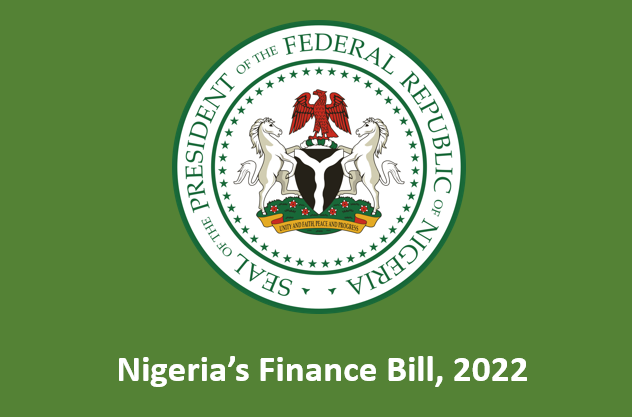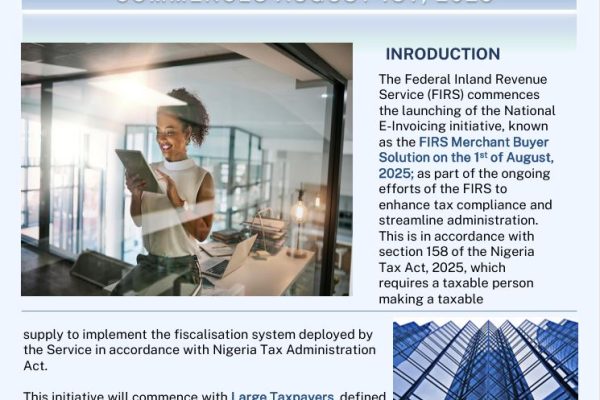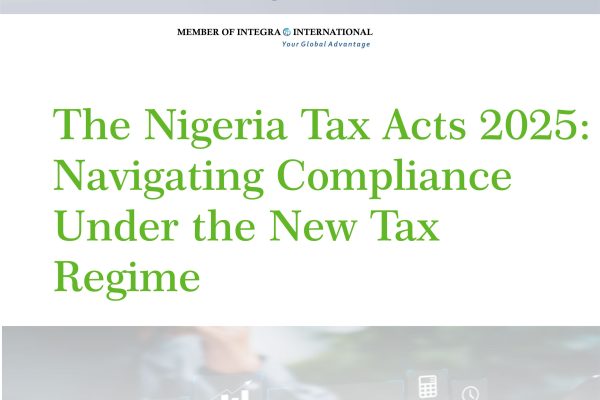Highlights Of The Finance Bill 2022 And Its Implication On The Nigerian Tax Scape.
Introduction
The Finance Bill 2022 was recently published to amend relevant tax, in line with the macroeconomic policy reforms of the Federal Government and also to amend and make further provisions in specific laws in connection with the public financial management of the Federation.
The Bill was passed on Wednesday, December 28th 2022 by the Senate and House of Representatives. With the passing of the bill, it is uncertain how the public hearing slated for January 13th 2023 by the House of Representatives will affect the bill.
Company Income Tax Act
- Medium and large companies engaged in the commercial winning, capture, production and utilization of associated and non-associated gas shall be allowed investment allowance of 10% and 5% per annum on their qualifying capital expenditure subject to attaining a cumulative production of 300 billion cubic feet.
- The investment allowance on qualifying capital expenditure of 10% is being repealed. This will however not affect assets acquired on or before 31st December 2022.
- The rural investment allowance which is granted to businesses located at least 20km away from certain facilities provided by the government is being repealed. This will however not affect assets acquired on or before 31st December 2022.
- 25% of incomes in convertible currencies derived from tourists by a hotel shall no longer be exempt from tax provided that a company that has set aside reserved funds shall continue to enjoy the exemption until the funds are fully utilized.
- Gas flaring medium and large companies (companies that vents or flares associated or non-associated natural gas unless in the case of an emergency) are now liable to the income tax rate of 50% as against the former 30%.
- Increase in Tertiary Education tax rate from 2.5% to 3%.
- Exemption of companies engaged in upstream and midstream gas operations (along with Agro Allied businesses and manufacturing companies) from the annual restriction of capital allowance utilization to 2/3rd of assessable profit.
Value Added Tax Act
- Anti-Avoidance Rule is introduced into the Value Added Tax Act to combat aggressive Transfer Pricing, Base Erosion, Profit Shifting and Tax Evasion.
- Persons appointed to deduct VAT at source on invoices received from their vendors are now to remit such VAT to the FIRS on or before the 14th day of the following month (currently the 21st day of the following month).
- An importer of taxable goods that are purchased through an online, electronic or digital platform, operated by a non-resident supplier that has been appointed as an agent of the Service for the collection of the tax, is required to provide proof of such appointment and VAT charged on the invoice as a condition for clearing the goods without further VAT.
- Building is redefined for VAT purposes to exclude any fixtures or structures that can be easily removed from land such as radio and television masts, transmission lines, cell towers, mobile homes etc. This implies that such assets are not eligible for the VAT exemption on a building.
Personal Income Tax Act
Any amount paid as premium by an individual during the preceding year of assessment in respect of their own life or the life of a spouse, or contract for a deferred annuity will be tax deductible provided that any portion of a deferred annuity withdrawn within 5 years of paying the premium will be taxed at the point of withdrawal.
Capital Gains Tax Act
- Gains on digital assets including crypto-currency are now chargeable to tax under the Capital gains tax act at the rate of 10%.
- Loss on disposal of a chargeable asset shall be deductible against any chargeable gain from the disposal of other assets from the same asset class. In a case where the loss exceeds the gain, the excess shall be carried forward to the next year.
- Capital losses deductible for CGT purposes may be carried forward for a maximum of 5 years.
Custom and Excise Tariff Tax Act
- Eligible goods imported into Nigeria from outside Africa to finance capital contributions, subscriptions and other financial obligations to multilateral institutions such as United Nations are now liable to a levy of 0.5%.
- All services, including but not limited to telecommunication services provided in Nigeria shall be charged with duties of excise at the rate specified in the schedule by the President’s order.
Petroleum Profit Tax Act
- Section 2 of the PPTA is amended by redefining Commission as the Nigerian Upstream Petroleum Regulatory Commission, established under the Petroleum Industry Act, 2021.
- Any amount contributed to a fund, scheme or arrangement approved by the Commission for the purpose of decommissioning and abandonment, subject to the production of the Statement of Account of the decommissioning and abandonment fund: Provided that the surplus or residue of the fund after decommissioning and abandonment of the field shall be subject to tax under this Act;
Stamp Duties Tax Act
The electronic money transfer levy is being re-distributed as 15% to Federal government, 50% to State government and 35% to Local government.
Conclusion
An amendment has been made to change the name of the FIRS to Nigeria Revenue Service and the board is to be separate from the Service which will be headed by a Commissioner General.
Commencement date of the Bill changed from 1st January 2022 to 1st January 2023. There is still no news about the public hearing that was supposed to hold on January 13th 2023. However, we are still uncertain about the changes that might occur.











